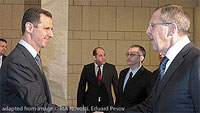Syrian position affects Russia’s image abroad

(Russia Beyond the Headlines – rbth.ru – Marina Obrazkova, RBTH – September 9, 2013)
According to a survey, the worst attitudes toward Russia are expressed, ironically, by people in countries where Russian tourists traditionally go: Israel, Turkey, Jordan and Egypt. Experts explain this by the nuance that participants in the survey primarily evaluated not the country and its inhabitants, but the state’s position on the Syrian issue.
Prior to the G20 Summit in St. Petersburg, Pew Research conducted a sociological research and found out that Russia has developed a mainly negative image abroad. Most of the negative opinions were given in Israel (77 percent), Jordan (70 percent), Turkey (66 percent), and France, Japan and Egypt (64 percent).
According to the survey, an overall negative attitude toward Russia was expressed by 39 percent of respondents, while 36 percent expressed a positive attitude. Positive feedback was won by Russia in Greece (63 percent) and South Korea (53 percent). Positive reviews also prevailed in African countries, with the exception of South Africa.
In addition, positive views were expressed by Canadians, Australians, and Malaysians, as well as by people of Indonesia. In Venezuela, a country usually loyal to Russia, citizens’ opinions were almost equally divided; a similar situation occurred in Chile.
In the U.S., the number of opponents and defenders was almost equal 43 percent and 37 percent, respectively. European countries also were not particularly positively inclined toward Russia: More than a half of the populations of Germany, Italy and Poland had negative attitudes to share.
The meaning behind the poll results was explained to RBTH by the head of the Russian Cooperation Agency, Konstantin Kosachev. According to him, the results from this kind of survey strongly depend on the language that is used by sociologists. The expert believes that, in the West, there is a widely spread “presumption of guilt” of Russia.
“Formally, it is a question about the attitude toward Russia, but, unexpectedly, the ‘peak of the negative’ happened to be in Israel, Turkey, Egypt that is, the countries to which millions of Russians go and where they are greeted with a warm welcome and great involvement of the local population in the preservation of good relations,” said Kosachev.
However, taking a look at what has recently been said in the world, in general, and in those countries, in particular, everything falls into place at once: Syria. Everything is hidden in the position of Russia on the Syrian issue.
Very characteristic is the data on Lebanon, which amounts, in theory, to 53 percent negative toward Russia; however, if among Lebanese Sunnis 86 percent are negatively disposed toward Russia, then, among the Shiites it is only 9 percent.
Kosachev clarified that the poll shows an attitude not toward the country itself, but toward its position on a particular foreign policy issue. The expert explained that the survey could give us some insight into how Russia is reflected in the local media of surveyed countries.
“Apparently, in Greece and in South Korea, nothing wrong is written about us, and people estimate the ways that is called as it is. After all, if foreigners are asked how they relate to, say, Tchaikovsky, Russian cuisine and Lake Baikal, then the numbers would most probably differ,” said Kosachev.
“However, people are not told about Baikal and Tchaikovsky, but about this or that Russia following its own logic, preventing ‘good states’ from attacking a ‘bad country.’ Actually, these rankings and polls appear very precise at the point where it is essential to convince the public about the ‘outcast’ Russia, about the unpopularity of its position, without explaining the essence of the position itself. These rankings serve as an effective tool for shaping public opinion,” Kosachev said.
The expert also brought up a positive aspect of the poll. It turns out that the youth holds a special position: “Statistics on young people from 1829 years show that they have a much better attitude toward our country, compared to the older generation [in the U.S., Japan and Germany, about a half of the young respondents spoke positively about Russia, which is 2025 percent higher than older respondents].”
“Whatever was behind this perhaps a skeptical attitude toward the local media, a lack of ‘Cold War complexes,’ or personal experience through practical communication with Russian peers it does not matter. What does matter is the fact that youth of other countries are willing to better understand and accept our country. And this means that Russia has good prospects for the future, when the world stage is finally free of the veterans of the ‘cold’ information battle,” said Kosachev.
Deputy Director of the Institute of Europe at the Russian Academy of Sciences, Sergei Karaganov, agrees with Kosachev that people evaluated mostly the Russian position on the Syrian issue.
“Turkey is dominated by anti-Syrian sentiment; in Israel there is the same situation. Jordan is already overcrowded with a large influx of refugees from Syria, and it is unlikely that residents are satisfied with this situation. And the information that we supposedly support the president of the disputed territory cannot go unnoticed,” said Karaganov.
The expert noted that it is now more important to ask why so few countries have reacted positively toward Russia. “South Korea is likely to believe that we could help her with the North Korea. Greece is traditionally on the Russian side,” said Karaganov. “In addition, it would be interesting to know what the same people would answer to the [same] question about other countries.”
Article also appeared at http://rbth.ru/international/2013/09/09/syrian_position_affects_russias_image_abroad_29633.html
